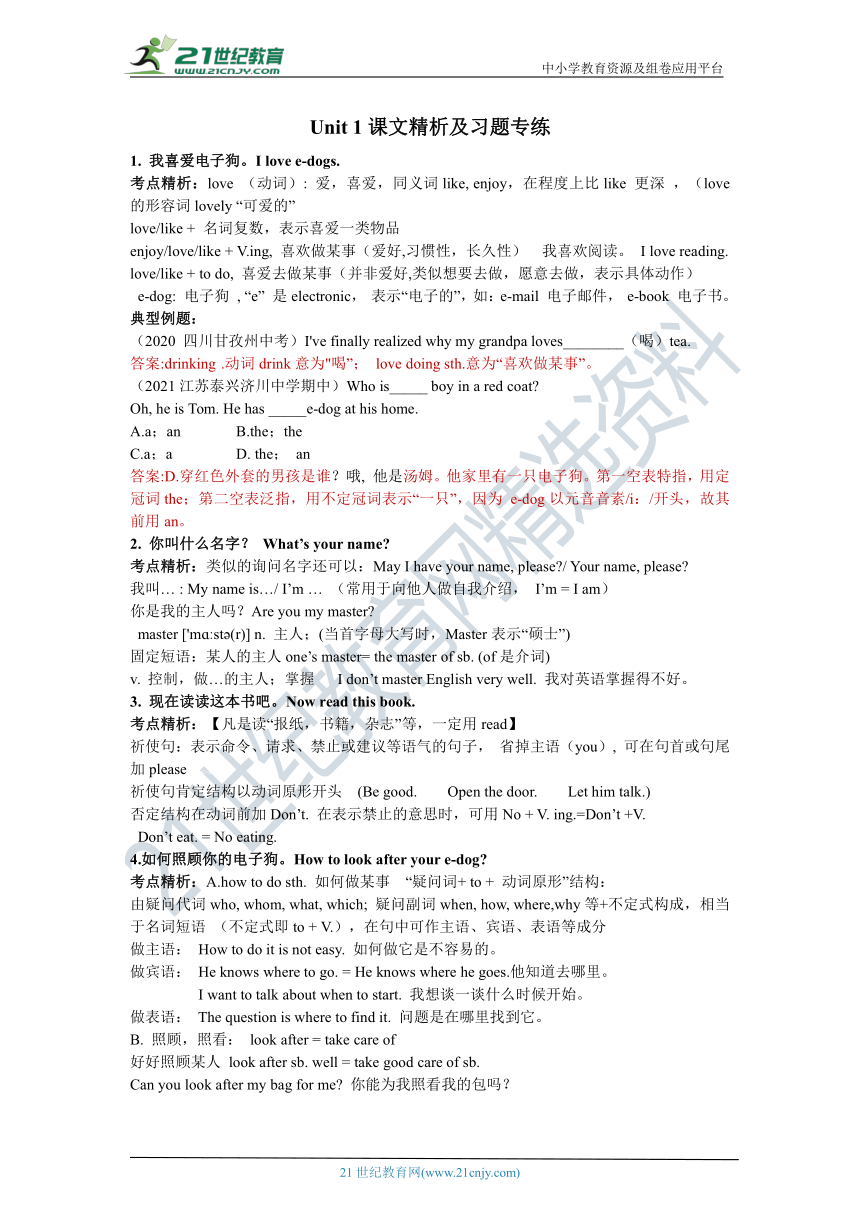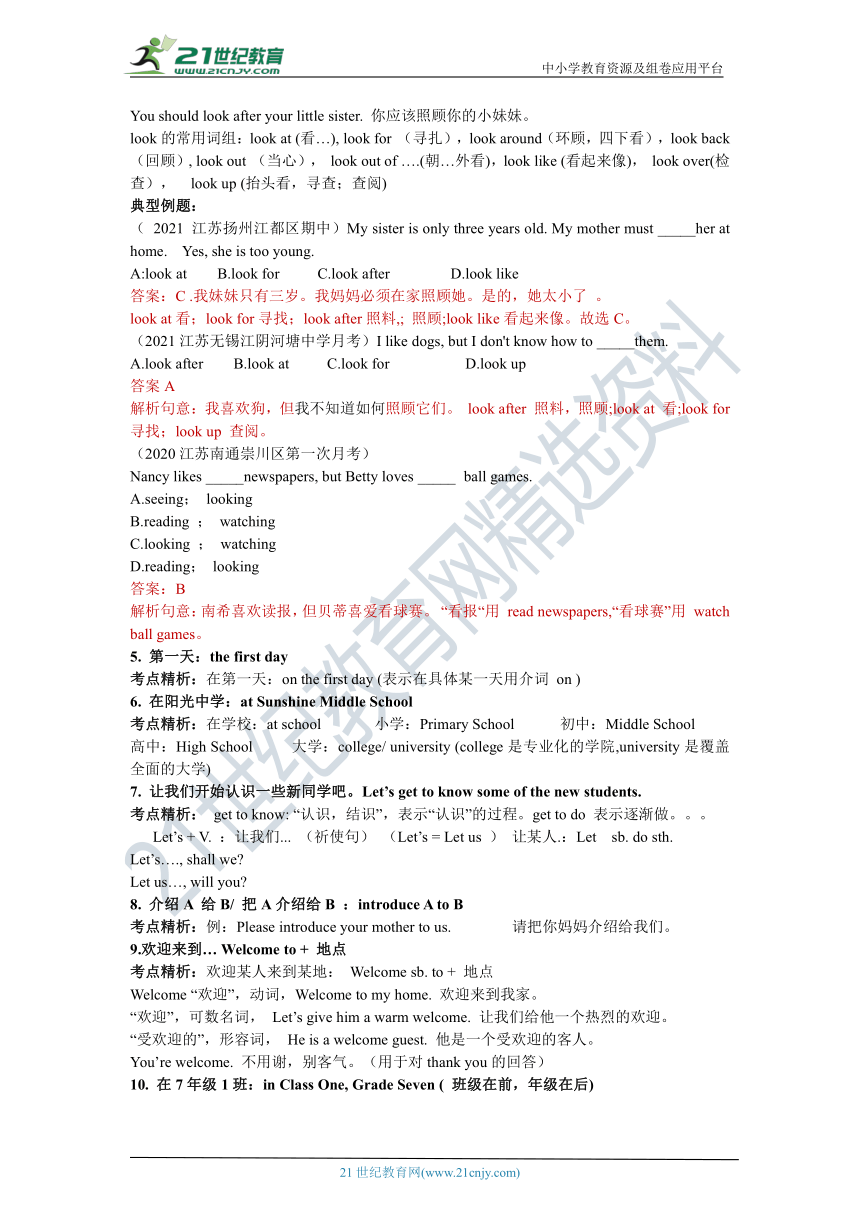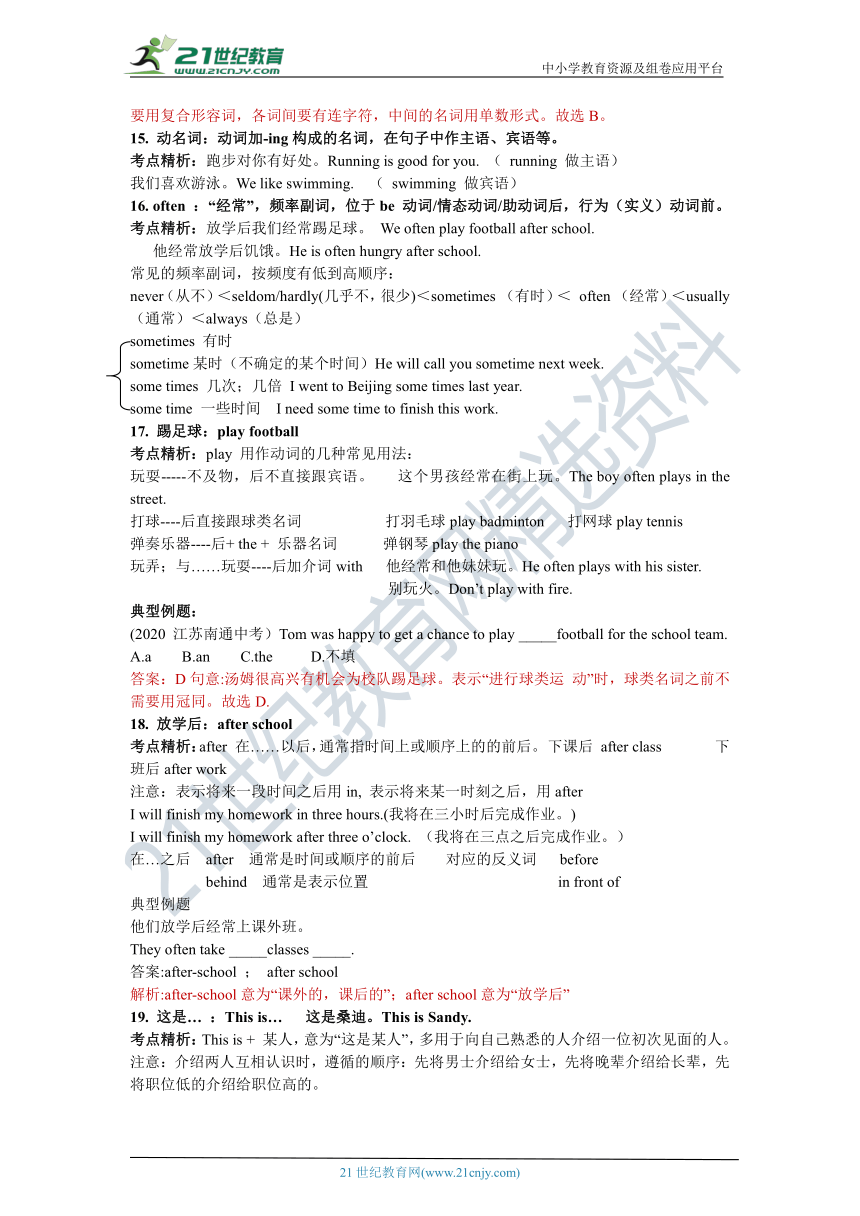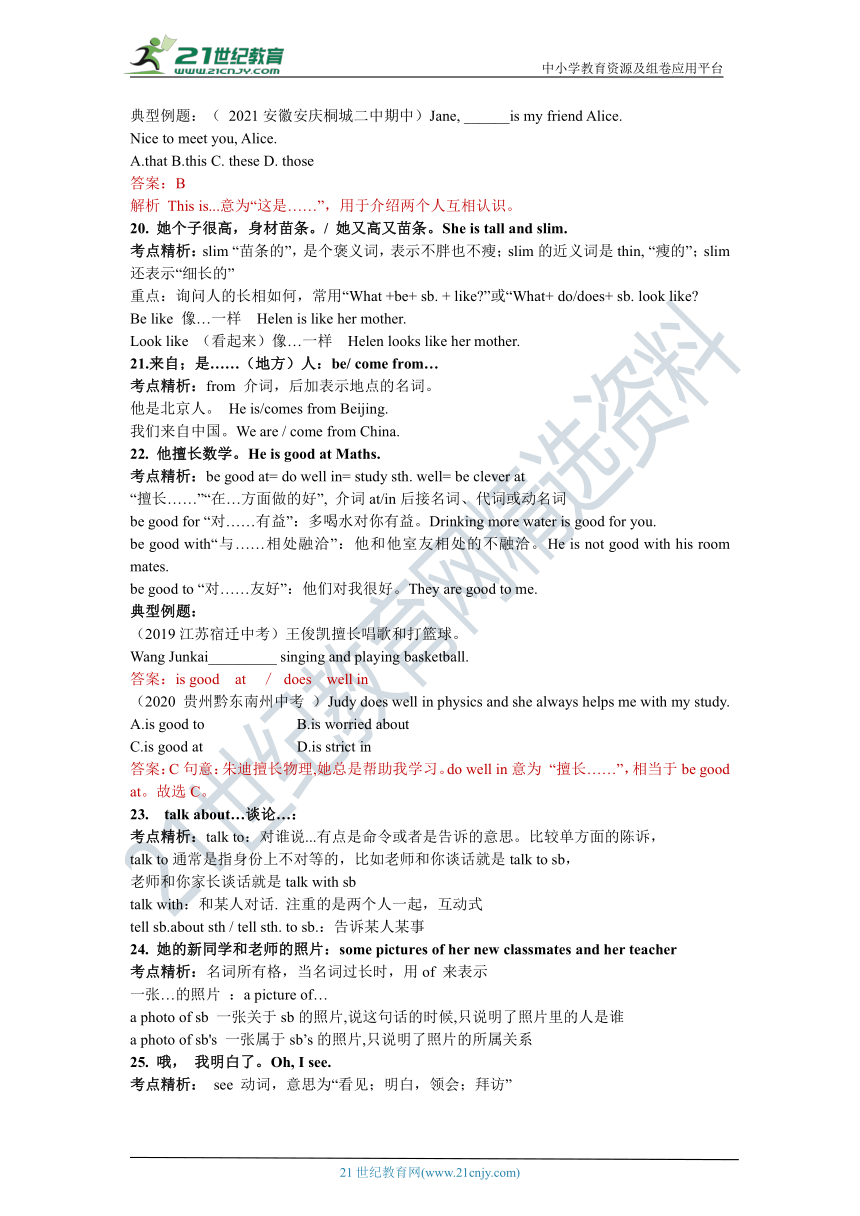Unit 1This is me 课文精析+典题精例(含答案)
文档属性
| 名称 | Unit 1This is me 课文精析+典题精例(含答案) |  | |
| 格式 | doc | ||
| 文件大小 | 1.3MB | ||
| 资源类型 | 试卷 | ||
| 版本资源 | 牛津译林版 | ||
| 科目 | 英语 | ||
| 更新时间 | 2021-09-07 14:53:09 | ||
图片预览





文档简介
中小学教育资源及组卷应用平台
Unit
1课文精析及习题专练
1.
我喜爱电子狗。I
love
e-dogs.
考点精析:love
(动词):
爱,喜爱
(?http:?/??/?www.21cnjy.com?),同义词like,
enjoy,在程度上比like
更深
,(love的形容词lovely
“可爱的”21·世纪
教育网
love/like
+
名词复数,表示喜爱一类物品
enjoy/love/like
+
V.ing,
喜欢做某事(爱好,习惯性,长久性)
我喜欢阅读。
I
love
reading.
love/like
+
to
do,
喜爱去做某事(并非爱好,类似想要去做,愿意去做,表示具体动作)
e-dog:
电子狗
,
“e”
是electronic,
表示“电子的”,如:e-mail
电子邮件,
e-book
电子书。
典型例题:
(2020
四川甘孜州中考)I've
fi
(?http:?/??/?www.21cnjy.com?)nally
realized
why
my
grandpa
loves________(喝)tea.
答案:drinking
.动词drink意为"喝”;
love
doing
sth.意为“喜欢做某事”。
(2021江苏泰兴济川中学期中)Who
is_____
boy
in
a
red
coat?
Oh,
he
is
Tom.
He
has
_____e-dog
at
his
home.
A.a;an
B.the;the
C.a;a
D.
the;
an
答案:D.穿红色外套的男孩是谁?哦,
他是
(?http:?/??/?www.21cnjy.com?)汤姆。他家里有一只电子狗。第一空表特指,用定冠词the;第二空表泛指,用不定冠词表示“一只”,因为
e-dog以元音音素/i:/开头,故其前用an。21cnjy.com
2.
你叫什么名字?
What’s
your
name?
考点精析:类似的询问名字还可以:May
I
have
your
name,
please?/
Your
name,
please?
我叫…
:
My
name
is…/
I’m
…
(常用于向他人做自我介绍,
I’m
=
I
am)
你是我的主人吗?Are
you
my
master?
master
['mɑ?st?(r)]
n.
主人;(当首字母大写时,Master表示“硕士”)
固定短语:某人的主人one’s
master=
the
master
of
sb.
(of是介词)
v.
控制,做…的主人;掌握
I
don’t
master
English
very
well.
我对英语掌握得不好。
3.
现在读读这本书吧。Now
read
this
book.
考点精析:【凡是读“报纸,书籍,杂志”等,一定用read】
祈使句:表示命令、请求、禁止或建议等语气的句子,
省掉主语(you),
可在句首或句尾加please2-1-c-n-j-y
祈使句肯定结构以动词原形开头
(Be
good.
Open
the
door.
Let
him
talk.)
否定结构在动词前加Don’t.
在表示禁止的意思时,可用No
+
V.
ing.=Don’t
+V.
Don’t
eat.
=
No
eating.
4.如何照顾你的电子狗。How
to
look
after
your
e-dog?
考点精析:A.how
to
do
sth.
如何做某事
“疑问词+
to
+
动词原形”结构:
由疑问代词who,
who
(?http:?/??/?www.21cnjy.com?)m,
what,
which;
疑问副词when,
how,
where,why等+不定式构成,相当于名词短语
(不定式即to
+
V.),在句中可作主语、宾语、表语等成分
做主语:
How
to
do
it
is
not
easy.
如何做它是不容易的。
做宾语:
He
knows
where
to
go.
=
He
knows
where
he
goes.他知道去哪里。
I
want
to
talk
about
when
to
start.
我想谈一谈什么时候开始。
做表语:
The
question
is
where
to
find
it.
问题是在哪里找到它。
B.
照顾,照看:
look
after
=
take
care
of
好好照顾某人
look
after
sb.
well
=
take
good
care
of
sb.
21
cnjy
com
Can
you
look
after
my
bag
for
me?
你能为我照看我的包吗?
You
should
look
after
your
little
sister.
你应该照顾你的小妹妹。【来源:21cnj
y.co
m】
look的常用词组:look
at
(
(?http:?/??/?www.21cnjy.com?)看…),
look
for
(寻扎),look
around(环顾,四下看),look
back(回顾),
look
out
(当心),
look
out
of
….(朝…外看),look
like
(看起来像),
look
over(检查),
look
up
(抬头看,寻查;查阅)【出处:21教育名师】
典型例题:
(
2021
江苏扬州江都区期中)
(?http:?/??/?www.21cnjy.com?)My
sister
is
only
three
years
old.
My
mother
must
_____her
at
home.
Yes,
she
is
too
young.【版权所有:21教育】
A:look
at
B.look
for
C.look
after
D.look
like
21教育名师原创作品
答案:C
.我妹妹只有三岁。我妈妈必须在家照顾她。是的,她太小了
。
look
at看;look
for寻找;look
after照料,;
照顾;look
like看起来像。故选C。
(2021江苏无锡江阴河塘中学月考)I
like
dogs,
but
I
don't
know
how
to
_____them.
A.look
after
B.look
at
C.look
for
D.look
up21
cnjy
com
答案A
解析句意:我喜欢狗,但我不知道如何
(?http:?/??/?www.21cnjy.com?)照顾它们。
look
after
照料,照顾;look
at
看;look
for
寻找;look
up
查阅。
(2020江苏南通崇川区第一次月考)
Nancy
likes
_____newspapers,
but
Betty
loves
_____
ball
games.
A.seeing;
looking
B.reading
;
watching
C.looking
;
watching
D.reading;
looking
答案:B
解析句意:南希喜欢读报,但贝蒂喜爱看球赛。
“看报“用
read
newspapers,“看球赛”用
watch
ball
games。
5.
第一天:the
first
day
考点精析:在第一天:on
the
first
day
(表示在具体某一天用介词
on
)
6.
在阳光中学:at
Sunshine
Middle
School
考点精析:在学校:at
school
小学:Primary
School
初中:Middle
School
高中:High
School
大学:
(?http:?/??/?www.21cnjy.com?)college/
university
(college是专业化的学院,university是覆盖全面的大学)
7.
让我们开始认识一些新同学吧。Let’s
get
to
know
some
of
the
new
students.
考点精析:
get
to
know:
“认识,结识”,表示“认识”的过程。get
to
do
表示逐渐做。。。
Let’s
+
V.
:让我们...
(祈使句)
(Let’s
=
Let
us
)
让某人.:Let
sb.
do
sth.
Let’s….,
shall
we?
Let
us…,
will
you?
8.
介绍A
给B/
把A介绍给B
:introduce
A
to
B
考点精析:例:Please
introduce
your
mother
to
us.
请把你妈妈介绍给我们。
9.欢迎来到…
Welcome
to
+
地点
考点精析:欢迎某人来到某地:
Welcome
sb.
to
+
地点
Welcome
“欢迎”,动词,Welcome
to
my
home.
欢迎来到我家。
“欢迎”,可数名词,
Let’s
give
him
a
warm
welcome.
让我们给他一个热烈的欢迎。
“受欢迎的”,形容词,
He
is
a
welcome
guest.
他是一个受欢迎的客人。
You’re
welcome.
不用谢,别客气。(用于对thank
you的回答)
10.
在7年级1班:in
Class
One,
Grade
Seven
(
班级在前,年级在后)
考点精析:询问某人在几年级/几班?
What
class/grade
be
+
sb.
+
in?
表示“某年级某班”时,英语
(?http:?/??/?www.21cnjy.com?)和汉语的顺序相反,英语表达中先说小范围,后说大范围,即班级(class)在前,年
级(grade)在后。Class,grade的第一个字母要大写,后面的基数词若用英语单词表示,第一个字母也要大写。如:21教育网
He
is
in
Class
Eight,Grade
Seven.他在七年级八班。
(1)在英语中,编了号的东西可用两种方式表达:一种用序数词,另一种用基数词。请注意不同之
处。如:
the
first
unit
=
Unit
One
第一单元
(2)英语中有类似用法的词还有:number,
lesson,
group、room
等。
5号房间:Room
5
(?http:?/??/?www.21cnjy.com?)
=the
fifth
room
3号桌:
Table
3=the
third
table
第1排:Row
1=the
first
row
典型例题:
(2020江苏泰州常青藤学校联盟联考)Sandy
is
in__________.
A.
class
four,grade
seven
B.
Grade
Seven,Class
Four
C.
grade
seven,
class
four
D.
Class
Four,Grade
Seven
答案D
解析句意:桑迪在七年级四班。当表示“几年级几班”时,要按范围从小到大的顺序,先说班级再说年级,并
且class和grade首字母都要大写。21·cn·jy·com
11.
向某人打招呼:greet
sb.
考点精析:
greet
动词,
greeting
名词
12.
彼此,相互:each
other
13.
很高兴见到你。Nice
to
meet
you.=Happy
to
meet
you.=Glad
to
meet
you.
考点精析:(
meet用于初次见面,熟
(?http:?/??/?www.21cnjy.com?)人见面通常用nice
to
see
you.
)
对Nice
to
meet
you的回答可以是Nice
to
meet
you,
too.
也可以简单的说Me,
too.
14.
我12岁了。
I’m
12
years
old.
考点精析:
表示年龄:主语+
be
+
基数词+
(years
old
).
years
old
可以省略。
询问年龄:
How
old
+
be
+
主语?
(how
old
多大)
注意:复合形容词结构“基数词-单数名词
(?http:?/??/?www.21cnjy.com?)
(–形容词)”,这个结构只用做形容词来修饰名词,不做表语,也可以表示年龄,He
is
11.=
He
is
an
11-year-old
boy.
五米长的桥
five-meter-long
bridge
典型例题
(2019
江苏宿迁中考)WuDa
(?http:?/??/?www.21cnjy.com?)jing,
a_______
Chinese
skater,
set
a
new
world
record
at
the
Short
Track
World
Cup
last
year.
:
A.25-yeai-s-old
B.25
year
old
C.25-year-old
D.25
years
old
答案:C
解析句意:武大靖,一位25岁的中国滑冰运
(?http:?/??/?www.21cnjy.com?)动员,去年在短道速滑世界杯中创造了新的世界纪录。复合形容词在句中作定语,由"基数词-year/month/day-old
”构成,中间用连字符连接。
(2020
黑龙江牡丹江中考)
Wh
(?http:?/??/?www.21cnjy.com?)en
Chen
Xiarong
left
for
Wuhan
to
help,
her_______
daughter
cried
and
gave
her
a
hug.
A.6-year
old
B.6-year-old
C.6
years
old
答案:B句意:当陈心蓉去武汉支援时,她
(?http:?/??/?www.21cnjy.com?)6岁的女儿哭者给了她一个拥抱。表示“6岁的”要用复合形容词,各词间要有连字符,中间的名词用单数形式。故选B。
15.
动名词:动词加-ing构成的名词,在句子中作主语、宾语等。
考点精析:跑步对你有好处。Running
is
good
for
you.
(
running
做主语)
我们喜欢游泳。We
like
swimming.
(
swimming
做宾语)
16.
often
:“经常”,频率副词,位于be
动词/情态动词/助动词后,行为(实义)动词前。
考点精析:放学后我们经常踢足球。
We
often
play
football
after
school.
他经常放学后饥饿。He
is
often
hungry
after
school.
常见的频率副词,按频度有低到高顺序:
never(从不)<seldo
(?http:?/??/?www.21cnjy.com?)m/hardly(几乎不,很少)<sometimes
(有时)<
often
(经常)<usually(通常)<always(总是)
sometimes
有时
sometime某时(不确定的某个时间)He
will
call
you
sometime
next
week.
some
times
几次;几倍
I
went
to
Beijing
some
times
last
year.
some
time
一些时间
I
need
some
time
to
finish
this
work.
17.
踢足球:play
football
考点精析:play
用作动词的几种常见用法:
玩耍-----不及物,后不直接跟宾语。
这个男孩经常在街上玩。The
boy
often
plays
in
the
street.
打球----后直接跟球类名词
打羽毛球play
badminton
打网球play
tennis
弹奏乐器----后+
the
+
乐器名词
弹钢琴play
the
piano
玩弄;与……玩耍----后加介词with
他经常和他妹妹玩。He
often
plays
with
his
sister.
别玩火。Don’t
play
with
fire.
典型例题:
(2020
江苏南通中考)Tom
wa
(?http:?/??/?www.21cnjy.com?)s
happy
to
get
a
chance
to
play
_____football
for
the
school
team.
A.a
B.an
C.the
D.不填
答案:D句意:汤姆很高兴有机会为校队踢足球。表示“进行球类运
动”时,球类名词之前不需要用冠同。故选D.
18.
放学后:after
school
考点精析:after
在……以后,通常指时间上或顺序上的的前后。
下课后
after
class
下班后after
work
注意:表示将来一段时间之后用in,
表示将来某一时刻之后,用after
I
will
finish
my
homework
in
three
hours.(我将在三小时后完成作业。)
I
will
finish
my
homework
after
three
o’clock.
(我将在三点之后完成作业。)
在…之后
after
通常是时间或顺序的前后
对应的反义词
before
behind
通常是表示位置
in
front
of
典型例题
他们放学后经常上课外班。
They
often
take
_____classes
_____.
答案:after-school
;
after
school
解析:after-school意为“课外的,课后的”;after
school意为“放学后”
19.
这是…
:This
is…
这是桑迪。This
is
Sandy.
考点精析:This
is
+
某人,意为“
(?http:?/??/?www.21cnjy.com?)这是某人”,多用于向自己熟悉的人介绍一位初次见面的人。注意:介绍两人互相认识时,遵循的顺序:先将男士介绍给女士,先将晚辈介绍给长辈,先将职位低的介绍给职位高的。
典型例题:(
2021安徽安庆桐城二中期中)Jane,
______is
my
friend
Alice.
Nice
to
meet
you,
Alice.
A.that
B.this
C.
these
D.
those
答案:B
解析
This
is...意为“这是……”,用于介绍两个人互相认识。
20.
她个子很高,身材苗条。/
她又高又苗条。She
is
tall
and
slim.
考点精析:slim
“苗条的”,是个褒义词,表示不胖也不瘦;slim的近义词是thin,
“瘦的”;slim还表示“细长的”
重点:询问人的长相如何,常用“What
+be+
sb.
+
like?”或“What+
do/does+
sb.
look
like?
Be
like
像…一样
Helen
is
like
her
mother.
Look
like
(看起来)像…一样
Helen
looks
like
her
mother.
21.来自;是……(地方)人:be/
come
from…
考点精析:from
介词,后加表示地点的名词。
他是北京人。
He
is/comes
from
Beijing.
我们来自中国。We
are
/
come
from
China.
22.
他擅长数学。He
is
good
at
Maths.
考点精析:be
good
at=
do
well
in=
study
sth.
well=
be
clever
at
“擅长……”“在…方面做的好”,
介词at/in后接名词、代词或动名词
be
good
for
“对……有益”:多喝水对你有益。Drinking
more
water
is
good
for
you.
be
good
with“与……相处融洽”:他和他室友相处的不融洽。He
is
not
good
with
his
room
mates.
be
good
to
“对……友好”:他们对我很好。They
are
good
to
me.
典型例题:
(2019江苏宿迁中考)王俊凯擅长唱歌和打篮球。
Wang
Junkai_________
singing
and
playing
basketball.
答案:is
good at /
does well
in
(2020
贵州黔东南州中考
(?http:?/??/?www.21cnjy.com?)
)
Judy
does
well
in
physics
and
she
always
helps
me
with
my
study.
A.is
good
to
B.is
worried
about
C.is
good
at
D.is
strict
in
答案:C句意:朱迪擅长物理,她总是帮助我学习。do
well
in意为
“擅长……”,相当于be
good
at。故选C。
23.
talk
about…谈论…:
考点精析:talk
to:对谁说...有点是命令或者是告诉的意思。比较单方面的陈诉,
talk
to通常是指身份上不对等的,比如老师和你谈话就是talk
to
sb,
老师和你家长谈话就是talk
with
sb
talk
with:和某人对话.
注重的是两个人一起,互动式
tell
sb.about
sth
/
tell
sth.
to
sb.:告诉某人某事
24.
她的新同学和老师的照片:some
pictures
of
her
new
classmates
and
her
teacher
考点精析:名词所有格,当名词过长时,用of
来表示
一张…的照片
:a
picture
of…
a
photo
of
sb
一张关于s
(?http:?/??/?www.21cnjy.com?)b的照片,说这句话的时候,只说明了照片里的人是谁
a
photo
of
sb's
一张属于sb’s的照片,只说明了照片的所属关系www-2-1-cnjy-com
25.
哦,
我明白了。Oh,
I
see.
考点精析:
see
动词,意思为“看见;明白,领会;拜访”
让我想想。
Let
me
see.
明天/今晚/回头见。See
you
tomorrow/tonight/later.
(See
you.
再见。)
重点:看见某人正在做某事see
sb.
doing
sth.
看见某人经常做某事:see
sb.
do
sth.
26.
看,桑迪在那儿。Look,
Sandy
is
over
there.
考点精析:
Over:
用做副词,意为“穿过(街道,开阔的空间等);翻到”
在那边/儿:over
there
,
指相对较远的地方。
距离远近:here
<
there
<
over
there
look
不及物动词,表示“看......”要用
look
at…,
如单独放在句首,后面的句子用现在进行时。
listen不及物动词,表示“听……”要用listen
to…,
如单独放在句首,后面的句子用现在进行时。
27.
教室也很大。
The
classrooms
are
big
too.
(too
也,副词)
考点精析:classroom:教室,
合成名词
,
class(班)+
room
(房间)
spaceship:宇宙飞船,
space(太空)+
ship(轮船)
classmate:同班同学,
class(班)+
mate
(伙伴)
girlfriend:女朋友
girl
(女孩)+
friend
(朋友)
28.
帮助某人做某事:help
sb.
do
sth.
=
help
sb
to
do
sth.
考点精析:他经常帮助同学打扫教室。
He
often
helps
his
classmates
clean
the
class.
在某方面帮助某人
help
sb
with+名词
29.在表中:in
the
table
考点精析:
table:
表格;目录
30.注意……:pay
attention
to
…
考点精析:“to”是介词,后接名词、代词做宾语。
请注意如何说话。Please
pay
(?http:?/??/?www.21cnjy.com?)attention
to
how
to
talk.
(参考“how
to+
动原”结构,相当于名词)21世纪教育网版权所有
31.
与……相同:the
same
as…
考点精析:我的书和他的一样。My
book
is
the
same
as
yours.
32.
这些学生经常放风筝。These
students
often
fly
kites.
考点精析:these“这些”,指示代词(this/that,these/those),these和those可数名词复数,
放风筝:fly
kites,
fly此处为及物动词,意为“放(风筝等)”
fly作不及物动词,意为①“飞,飞行”,
Birds
fly
in
the
sky.
②“乘(飞机)”,fly
to…意为“乘飞机去……”They
often
fly
to
Shanghai.
fly作为名词,意为“苍蝇”,
a
fly,
some
flies
33.
有时候我们回家很晚。Sometimes
we
go
home
late.
考点精析:
go
home
为“回家”,
(?http:?/??/?www.21cnjy.com?)go不及物动词,意为“去”,表示“去某地”用“go
to
+
地点名词”。在本句,home为副词,故不带to.
34.Hello,
everyone!
大家好!
考点精析:(everyone,
everything,
everybody
做主语,动词用单数)
everyone不定代词,意为“每人,人人”,相当于everybody只指人(强调全部),做主语时看做单数
今天大家都来了吗?
Is
everyone
here
today?
everyone与否定词连用表示部分否定
例如:Everyone
can’t
be
a
singer.(并非每个人都可以成为歌手。)
Everyone
has
a
book.
Everyone
doesn’t
have
a
book.
everyone
只指人,不指事物,后不可接of…
,
做主语时,
谓语动词用三单。
every
one
既指人,也可指事物,后可以接of+复数
,做主语时,谓语动词用三单。
典型例题:
(2020江苏南通北城中学期末)______everyone
in
your
family______the
Chinese
New
Year?
Yes,of
course.
A.Do;like
B.Is;like
C.Is;
likes
D.
Does;
like
答案:D
句意:你家每个人都喜欢中国新年吗?
(?http:?/??/?www.21cnjy.com?)是的,当然。
主语是everyone,谓语动词应该用单数形式,所以应该用助动同
does;助动词does后面要用动词原形,故答案为D。
(
2019
江苏盐城中考)_______needs
one
or
two
close
friends
to
share
his
happiness
and
sadness
with.
A.Someone
B.No
one
C.None
D.
Everyone
答案:D
句意:毎个人都需要一两个亲密的朋友来分享
(?http:?/??/?www.21cnjy.com?)他的幸福和悲伤。someone某人;no
one没人;none没有一个人或物;everyone
每个人。结合句意可知选D。
35.
但是:but
考点精析:由but连接的并列单词、
(?http:?/??/?www.21cnjy.com?)词组或句子,在意思上是转折关系。My
grandpa
is
very
old,
but
he
is
strong.
And,
so所以,
or或者,否则,
but但是
36.
我和我的家人住在北京。
I
live
with
my
family
in
Beijing.
考点精析:和…住在…:live
wi
(?http:?/??/?www.21cnjy.com?)th…
in
…=live
in…
with…
David
lives
with
his
father
in
China.
family此处用作集体名词,意为“家人”,
All
my
family
are
in
Hangzhou.
我的家人都在杭州。www.21-cn-jy.com
family可以指家庭,强调整体,看做单数;也可以指家庭成员,强调每个人,看做复数。
His
family
is
large.
他的家庭是个大家庭。
His
family
are
all
well.
他的家人都很健康。
37.
我戴眼镜。
I
wear
glasses.
考点精析:
Wear
及物动词,意为“穿,戴”,后接穿(戴)的对象,可指衣服、鞋帽和饰品等。
wear
意为“穿着,戴着”,后面跟衣服、鞋帽、袜子、手套、手表等。强调穿戴的状态。此词后还可跟表示颜色的单词,表示“穿…颜色的衣服”。
He
wears
a
black
shirts
today.
他今天穿着一件黑色衬衣。She
likes
wearing
white.
她喜欢穿白色衣服。
put
on
意为“穿上,戴上”,后面跟衣服、鞋帽、袜子等。指穿戴的动作,强调从没穿、没戴到穿上、戴上这个动作的转变。
Put
on
your
shoes.
穿上你的鞋子。Please
put
it
on.
请穿上它。
in
是介词,也是指“穿着”的状态
the
boy
in
blue
38.
眼镜:glasses,复数形式的名词,
a
pair
of
glasses
考点精析:
①
glass
作为不可数名词,意为“玻璃”,a
piece
of
glass
一块玻璃
②
glass作为可数名词,意为“玻璃杯”,复数为
glasses,a
glass
of
water
一杯水
39.所有的课程:
all
the
lessons
考点精析:all
此处为形容词,意为“
(?http:?/??/?www.21cnjy.com?)所有的,全部的”,只能用于三者或三者以上,后可跟可数名词复数或不可数名词,在修饰名词时,all后要加the
或his,
these
等
all
the
world
(?http:?/??/?www.21cnjy.com?)全世界
all
our
teachers
我们所有的老师
all
his
money
他所有的钱
all作代词时,意为“全部,一切”,常和人称代词连用,all
of
them,
all
of
us
40.
静态句一般现在时
考点精析:主语+
am/is/are+
其他
【这样的没有动作的句子是
主系表结构】
41.
Good
morning./Good
afternoon./Good
evening./Good
night.2·1·c·n·j·y
考点精析:
Good
morning.
早上好
用于早上起床到中午十二点
Good
afternoon.
下午好
用于中午十二点到傍晚六点。
Good
evening.
晚上好
晚上饭后到睡觉前。
Good
night.晚安。
晚上睡觉前或晚上分手的道别。
42.half
an
hour半小时。half名词,“半;一半;二分之一”
?考点精析:
two
hours
and
a
half=two
and
a
half
hours“两个半小时;两小时半”
?
half
a
day半天?????????
half
a
year半年
?
Half
of
six
is
three.六的一半是三。
43.grandparent名词,“祖(外祖)父;祖(外祖)母”是指其中之一;
?考点精析:?grandp
(?http:?/??/?www.21cnjy.com?)arents名词,“祖父(母);外祖父(母)”是指双亲,两个人。=father’s
or
mother’s
parents【来源:21·世纪·教育·网】
??grandfather祖父;外祖父????
grandmother祖母;外祖母
??grandson
孙子;外孙子??????
granddaughter孙女;外孙女
??grandchild孙子(女);外孙子(女)
21世纪教育网
www.21cnjy.com
精品试卷·第
2
页
(共
2
页)
HYPERLINK
"http://21世纪教育网(www.21cnjy.com)
"
21世纪教育网(www.21cnjy.com)
Unit
1课文精析及习题专练
1.
我喜爱电子狗。I
love
e-dogs.
考点精析:love
(动词):
爱,喜爱
(?http:?/??/?www.21cnjy.com?),同义词like,
enjoy,在程度上比like
更深
,(love的形容词lovely
“可爱的”21·世纪
教育网
love/like
+
名词复数,表示喜爱一类物品
enjoy/love/like
+
V.ing,
喜欢做某事(爱好,习惯性,长久性)
我喜欢阅读。
I
love
reading.
love/like
+
to
do,
喜爱去做某事(并非爱好,类似想要去做,愿意去做,表示具体动作)
e-dog:
电子狗
,
“e”
是electronic,
表示“电子的”,如:e-mail
电子邮件,
e-book
电子书。
典型例题:
(2020
四川甘孜州中考)I've
fi
(?http:?/??/?www.21cnjy.com?)nally
realized
why
my
grandpa
loves________(喝)tea.
答案:drinking
.动词drink意为"喝”;
love
doing
sth.意为“喜欢做某事”。
(2021江苏泰兴济川中学期中)Who
is_____
boy
in
a
red
coat?
Oh,
he
is
Tom.
He
has
_____e-dog
at
his
home.
A.a;an
B.the;the
C.a;a
D.
the;
an
答案:D.穿红色外套的男孩是谁?哦,
他是
(?http:?/??/?www.21cnjy.com?)汤姆。他家里有一只电子狗。第一空表特指,用定冠词the;第二空表泛指,用不定冠词表示“一只”,因为
e-dog以元音音素/i:/开头,故其前用an。21cnjy.com
2.
你叫什么名字?
What’s
your
name?
考点精析:类似的询问名字还可以:May
I
have
your
name,
please?/
Your
name,
please?
我叫…
:
My
name
is…/
I’m
…
(常用于向他人做自我介绍,
I’m
=
I
am)
你是我的主人吗?Are
you
my
master?
master
['mɑ?st?(r)]
n.
主人;(当首字母大写时,Master表示“硕士”)
固定短语:某人的主人one’s
master=
the
master
of
sb.
(of是介词)
v.
控制,做…的主人;掌握
I
don’t
master
English
very
well.
我对英语掌握得不好。
3.
现在读读这本书吧。Now
read
this
book.
考点精析:【凡是读“报纸,书籍,杂志”等,一定用read】
祈使句:表示命令、请求、禁止或建议等语气的句子,
省掉主语(you),
可在句首或句尾加please2-1-c-n-j-y
祈使句肯定结构以动词原形开头
(Be
good.
Open
the
door.
Let
him
talk.)
否定结构在动词前加Don’t.
在表示禁止的意思时,可用No
+
V.
ing.=Don’t
+V.
Don’t
eat.
=
No
eating.
4.如何照顾你的电子狗。How
to
look
after
your
e-dog?
考点精析:A.how
to
do
sth.
如何做某事
“疑问词+
to
+
动词原形”结构:
由疑问代词who,
who
(?http:?/??/?www.21cnjy.com?)m,
what,
which;
疑问副词when,
how,
where,why等+不定式构成,相当于名词短语
(不定式即to
+
V.),在句中可作主语、宾语、表语等成分
做主语:
How
to
do
it
is
not
easy.
如何做它是不容易的。
做宾语:
He
knows
where
to
go.
=
He
knows
where
he
goes.他知道去哪里。
I
want
to
talk
about
when
to
start.
我想谈一谈什么时候开始。
做表语:
The
question
is
where
to
find
it.
问题是在哪里找到它。
B.
照顾,照看:
look
after
=
take
care
of
好好照顾某人
look
after
sb.
well
=
take
good
care
of
sb.
21
cnjy
com
Can
you
look
after
my
bag
for
me?
你能为我照看我的包吗?
You
should
look
after
your
little
sister.
你应该照顾你的小妹妹。【来源:21cnj
y.co
m】
look的常用词组:look
at
(
(?http:?/??/?www.21cnjy.com?)看…),
look
for
(寻扎),look
around(环顾,四下看),look
back(回顾),
look
out
(当心),
look
out
of
….(朝…外看),look
like
(看起来像),
look
over(检查),
look
up
(抬头看,寻查;查阅)【出处:21教育名师】
典型例题:
(
2021
江苏扬州江都区期中)
(?http:?/??/?www.21cnjy.com?)My
sister
is
only
three
years
old.
My
mother
must
_____her
at
home.
Yes,
she
is
too
young.【版权所有:21教育】
A:look
at
B.look
for
C.look
after
D.look
like
21教育名师原创作品
答案:C
.我妹妹只有三岁。我妈妈必须在家照顾她。是的,她太小了
。
look
at看;look
for寻找;look
after照料,;
照顾;look
like看起来像。故选C。
(2021江苏无锡江阴河塘中学月考)I
like
dogs,
but
I
don't
know
how
to
_____them.
A.look
after
B.look
at
C.look
for
D.look
up21
cnjy
com
答案A
解析句意:我喜欢狗,但我不知道如何
(?http:?/??/?www.21cnjy.com?)照顾它们。
look
after
照料,照顾;look
at
看;look
for
寻找;look
up
查阅。
(2020江苏南通崇川区第一次月考)
Nancy
likes
_____newspapers,
but
Betty
loves
_____
ball
games.
A.seeing;
looking
B.reading
;
watching
C.looking
;
watching
D.reading;
looking
答案:B
解析句意:南希喜欢读报,但贝蒂喜爱看球赛。
“看报“用
read
newspapers,“看球赛”用
watch
ball
games。
5.
第一天:the
first
day
考点精析:在第一天:on
the
first
day
(表示在具体某一天用介词
on
)
6.
在阳光中学:at
Sunshine
Middle
School
考点精析:在学校:at
school
小学:Primary
School
初中:Middle
School
高中:High
School
大学:
(?http:?/??/?www.21cnjy.com?)college/
university
(college是专业化的学院,university是覆盖全面的大学)
7.
让我们开始认识一些新同学吧。Let’s
get
to
know
some
of
the
new
students.
考点精析:
get
to
know:
“认识,结识”,表示“认识”的过程。get
to
do
表示逐渐做。。。
Let’s
+
V.
:让我们...
(祈使句)
(Let’s
=
Let
us
)
让某人.:Let
sb.
do
sth.
Let’s….,
shall
we?
Let
us…,
will
you?
8.
介绍A
给B/
把A介绍给B
:introduce
A
to
B
考点精析:例:Please
introduce
your
mother
to
us.
请把你妈妈介绍给我们。
9.欢迎来到…
Welcome
to
+
地点
考点精析:欢迎某人来到某地:
Welcome
sb.
to
+
地点
Welcome
“欢迎”,动词,Welcome
to
my
home.
欢迎来到我家。
“欢迎”,可数名词,
Let’s
give
him
a
warm
welcome.
让我们给他一个热烈的欢迎。
“受欢迎的”,形容词,
He
is
a
welcome
guest.
他是一个受欢迎的客人。
You’re
welcome.
不用谢,别客气。(用于对thank
you的回答)
10.
在7年级1班:in
Class
One,
Grade
Seven
(
班级在前,年级在后)
考点精析:询问某人在几年级/几班?
What
class/grade
be
+
sb.
+
in?
表示“某年级某班”时,英语
(?http:?/??/?www.21cnjy.com?)和汉语的顺序相反,英语表达中先说小范围,后说大范围,即班级(class)在前,年
级(grade)在后。Class,grade的第一个字母要大写,后面的基数词若用英语单词表示,第一个字母也要大写。如:21教育网
He
is
in
Class
Eight,Grade
Seven.他在七年级八班。
(1)在英语中,编了号的东西可用两种方式表达:一种用序数词,另一种用基数词。请注意不同之
处。如:
the
first
unit
=
Unit
One
第一单元
(2)英语中有类似用法的词还有:number,
lesson,
group、room
等。
5号房间:Room
5
(?http:?/??/?www.21cnjy.com?)
=the
fifth
room
3号桌:
Table
3=the
third
table
第1排:Row
1=the
first
row
典型例题:
(2020江苏泰州常青藤学校联盟联考)Sandy
is
in__________.
A.
class
four,grade
seven
B.
Grade
Seven,Class
Four
C.
grade
seven,
class
four
D.
Class
Four,Grade
Seven
答案D
解析句意:桑迪在七年级四班。当表示“几年级几班”时,要按范围从小到大的顺序,先说班级再说年级,并
且class和grade首字母都要大写。21·cn·jy·com
11.
向某人打招呼:greet
sb.
考点精析:
greet
动词,
greeting
名词
12.
彼此,相互:each
other
13.
很高兴见到你。Nice
to
meet
you.=Happy
to
meet
you.=Glad
to
meet
you.
考点精析:(
meet用于初次见面,熟
(?http:?/??/?www.21cnjy.com?)人见面通常用nice
to
see
you.
)
对Nice
to
meet
you的回答可以是Nice
to
meet
you,
too.
也可以简单的说Me,
too.
14.
我12岁了。
I’m
12
years
old.
考点精析:
表示年龄:主语+
be
+
基数词+
(years
old
).
years
old
可以省略。
询问年龄:
How
old
+
be
+
主语?
(how
old
多大)
注意:复合形容词结构“基数词-单数名词
(?http:?/??/?www.21cnjy.com?)
(–形容词)”,这个结构只用做形容词来修饰名词,不做表语,也可以表示年龄,He
is
11.=
He
is
an
11-year-old
boy.
五米长的桥
five-meter-long
bridge
典型例题
(2019
江苏宿迁中考)WuDa
(?http:?/??/?www.21cnjy.com?)jing,
a_______
Chinese
skater,
set
a
new
world
record
at
the
Short
Track
World
Cup
last
year.
:
A.25-yeai-s-old
B.25
year
old
C.25-year-old
D.25
years
old
答案:C
解析句意:武大靖,一位25岁的中国滑冰运
(?http:?/??/?www.21cnjy.com?)动员,去年在短道速滑世界杯中创造了新的世界纪录。复合形容词在句中作定语,由"基数词-year/month/day-old
”构成,中间用连字符连接。
(2020
黑龙江牡丹江中考)
Wh
(?http:?/??/?www.21cnjy.com?)en
Chen
Xiarong
left
for
Wuhan
to
help,
her_______
daughter
cried
and
gave
her
a
hug.
A.6-year
old
B.6-year-old
C.6
years
old
答案:B句意:当陈心蓉去武汉支援时,她
(?http:?/??/?www.21cnjy.com?)6岁的女儿哭者给了她一个拥抱。表示“6岁的”要用复合形容词,各词间要有连字符,中间的名词用单数形式。故选B。
15.
动名词:动词加-ing构成的名词,在句子中作主语、宾语等。
考点精析:跑步对你有好处。Running
is
good
for
you.
(
running
做主语)
我们喜欢游泳。We
like
swimming.
(
swimming
做宾语)
16.
often
:“经常”,频率副词,位于be
动词/情态动词/助动词后,行为(实义)动词前。
考点精析:放学后我们经常踢足球。
We
often
play
football
after
school.
他经常放学后饥饿。He
is
often
hungry
after
school.
常见的频率副词,按频度有低到高顺序:
never(从不)<seldo
(?http:?/??/?www.21cnjy.com?)m/hardly(几乎不,很少)<sometimes
(有时)<
often
(经常)<usually(通常)<always(总是)
sometimes
有时
sometime某时(不确定的某个时间)He
will
call
you
sometime
next
week.
some
times
几次;几倍
I
went
to
Beijing
some
times
last
year.
some
time
一些时间
I
need
some
time
to
finish
this
work.
17.
踢足球:play
football
考点精析:play
用作动词的几种常见用法:
玩耍-----不及物,后不直接跟宾语。
这个男孩经常在街上玩。The
boy
often
plays
in
the
street.
打球----后直接跟球类名词
打羽毛球play
badminton
打网球play
tennis
弹奏乐器----后+
the
+
乐器名词
弹钢琴play
the
piano
玩弄;与……玩耍----后加介词with
他经常和他妹妹玩。He
often
plays
with
his
sister.
别玩火。Don’t
play
with
fire.
典型例题:
(2020
江苏南通中考)Tom
wa
(?http:?/??/?www.21cnjy.com?)s
happy
to
get
a
chance
to
play
_____football
for
the
school
team.
A.a
B.an
C.the
D.不填
答案:D句意:汤姆很高兴有机会为校队踢足球。表示“进行球类运
动”时,球类名词之前不需要用冠同。故选D.
18.
放学后:after
school
考点精析:after
在……以后,通常指时间上或顺序上的的前后。
下课后
after
class
下班后after
work
注意:表示将来一段时间之后用in,
表示将来某一时刻之后,用after
I
will
finish
my
homework
in
three
hours.(我将在三小时后完成作业。)
I
will
finish
my
homework
after
three
o’clock.
(我将在三点之后完成作业。)
在…之后
after
通常是时间或顺序的前后
对应的反义词
before
behind
通常是表示位置
in
front
of
典型例题
他们放学后经常上课外班。
They
often
take
_____classes
_____.
答案:after-school
;
after
school
解析:after-school意为“课外的,课后的”;after
school意为“放学后”
19.
这是…
:This
is…
这是桑迪。This
is
Sandy.
考点精析:This
is
+
某人,意为“
(?http:?/??/?www.21cnjy.com?)这是某人”,多用于向自己熟悉的人介绍一位初次见面的人。注意:介绍两人互相认识时,遵循的顺序:先将男士介绍给女士,先将晚辈介绍给长辈,先将职位低的介绍给职位高的。
典型例题:(
2021安徽安庆桐城二中期中)Jane,
______is
my
friend
Alice.
Nice
to
meet
you,
Alice.
A.that
B.this
C.
these
D.
those
答案:B
解析
This
is...意为“这是……”,用于介绍两个人互相认识。
20.
她个子很高,身材苗条。/
她又高又苗条。She
is
tall
and
slim.
考点精析:slim
“苗条的”,是个褒义词,表示不胖也不瘦;slim的近义词是thin,
“瘦的”;slim还表示“细长的”
重点:询问人的长相如何,常用“What
+be+
sb.
+
like?”或“What+
do/does+
sb.
look
like?
Be
like
像…一样
Helen
is
like
her
mother.
Look
like
(看起来)像…一样
Helen
looks
like
her
mother.
21.来自;是……(地方)人:be/
come
from…
考点精析:from
介词,后加表示地点的名词。
他是北京人。
He
is/comes
from
Beijing.
我们来自中国。We
are
/
come
from
China.
22.
他擅长数学。He
is
good
at
Maths.
考点精析:be
good
at=
do
well
in=
study
sth.
well=
be
clever
at
“擅长……”“在…方面做的好”,
介词at/in后接名词、代词或动名词
be
good
for
“对……有益”:多喝水对你有益。Drinking
more
water
is
good
for
you.
be
good
with“与……相处融洽”:他和他室友相处的不融洽。He
is
not
good
with
his
room
mates.
be
good
to
“对……友好”:他们对我很好。They
are
good
to
me.
典型例题:
(2019江苏宿迁中考)王俊凯擅长唱歌和打篮球。
Wang
Junkai_________
singing
and
playing
basketball.
答案:is
good at /
does well
in
(2020
贵州黔东南州中考
(?http:?/??/?www.21cnjy.com?)
)
Judy
does
well
in
physics
and
she
always
helps
me
with
my
study.
A.is
good
to
B.is
worried
about
C.is
good
at
D.is
strict
in
答案:C句意:朱迪擅长物理,她总是帮助我学习。do
well
in意为
“擅长……”,相当于be
good
at。故选C。
23.
talk
about…谈论…:
考点精析:talk
to:对谁说...有点是命令或者是告诉的意思。比较单方面的陈诉,
talk
to通常是指身份上不对等的,比如老师和你谈话就是talk
to
sb,
老师和你家长谈话就是talk
with
sb
talk
with:和某人对话.
注重的是两个人一起,互动式
tell
sb.about
sth
/
tell
sth.
to
sb.:告诉某人某事
24.
她的新同学和老师的照片:some
pictures
of
her
new
classmates
and
her
teacher
考点精析:名词所有格,当名词过长时,用of
来表示
一张…的照片
:a
picture
of…
a
photo
of
sb
一张关于s
(?http:?/??/?www.21cnjy.com?)b的照片,说这句话的时候,只说明了照片里的人是谁
a
photo
of
sb's
一张属于sb’s的照片,只说明了照片的所属关系www-2-1-cnjy-com
25.
哦,
我明白了。Oh,
I
see.
考点精析:
see
动词,意思为“看见;明白,领会;拜访”
让我想想。
Let
me
see.
明天/今晚/回头见。See
you
tomorrow/tonight/later.
(See
you.
再见。)
重点:看见某人正在做某事see
sb.
doing
sth.
看见某人经常做某事:see
sb.
do
sth.
26.
看,桑迪在那儿。Look,
Sandy
is
over
there.
考点精析:
Over:
用做副词,意为“穿过(街道,开阔的空间等);翻到”
在那边/儿:over
there
,
指相对较远的地方。
距离远近:here
<
there
<
over
there
look
不及物动词,表示“看......”要用
look
at…,
如单独放在句首,后面的句子用现在进行时。
listen不及物动词,表示“听……”要用listen
to…,
如单独放在句首,后面的句子用现在进行时。
27.
教室也很大。
The
classrooms
are
big
too.
(too
也,副词)
考点精析:classroom:教室,
合成名词
,
class(班)+
room
(房间)
spaceship:宇宙飞船,
space(太空)+
ship(轮船)
classmate:同班同学,
class(班)+
mate
(伙伴)
girlfriend:女朋友
girl
(女孩)+
friend
(朋友)
28.
帮助某人做某事:help
sb.
do
sth.
=
help
sb
to
do
sth.
考点精析:他经常帮助同学打扫教室。
He
often
helps
his
classmates
clean
the
class.
在某方面帮助某人
help
sb
with+名词
29.在表中:in
the
table
考点精析:
table:
表格;目录
30.注意……:pay
attention
to
…
考点精析:“to”是介词,后接名词、代词做宾语。
请注意如何说话。Please
pay
(?http:?/??/?www.21cnjy.com?)attention
to
how
to
talk.
(参考“how
to+
动原”结构,相当于名词)21世纪教育网版权所有
31.
与……相同:the
same
as…
考点精析:我的书和他的一样。My
book
is
the
same
as
yours.
32.
这些学生经常放风筝。These
students
often
fly
kites.
考点精析:these“这些”,指示代词(this/that,these/those),these和those可数名词复数,
放风筝:fly
kites,
fly此处为及物动词,意为“放(风筝等)”
fly作不及物动词,意为①“飞,飞行”,
Birds
fly
in
the
sky.
②“乘(飞机)”,fly
to…意为“乘飞机去……”They
often
fly
to
Shanghai.
fly作为名词,意为“苍蝇”,
a
fly,
some
flies
33.
有时候我们回家很晚。Sometimes
we
go
home
late.
考点精析:
go
home
为“回家”,
(?http:?/??/?www.21cnjy.com?)go不及物动词,意为“去”,表示“去某地”用“go
to
+
地点名词”。在本句,home为副词,故不带to.
34.Hello,
everyone!
大家好!
考点精析:(everyone,
everything,
everybody
做主语,动词用单数)
everyone不定代词,意为“每人,人人”,相当于everybody只指人(强调全部),做主语时看做单数
今天大家都来了吗?
Is
everyone
here
today?
everyone与否定词连用表示部分否定
例如:Everyone
can’t
be
a
singer.(并非每个人都可以成为歌手。)
Everyone
has
a
book.
Everyone
doesn’t
have
a
book.
everyone
只指人,不指事物,后不可接of…
,
做主语时,
谓语动词用三单。
every
one
既指人,也可指事物,后可以接of+复数
,做主语时,谓语动词用三单。
典型例题:
(2020江苏南通北城中学期末)______everyone
in
your
family______the
Chinese
New
Year?
Yes,of
course.
A.Do;like
B.Is;like
C.Is;
likes
D.
Does;
like
答案:D
句意:你家每个人都喜欢中国新年吗?
(?http:?/??/?www.21cnjy.com?)是的,当然。
主语是everyone,谓语动词应该用单数形式,所以应该用助动同
does;助动词does后面要用动词原形,故答案为D。
(
2019
江苏盐城中考)_______needs
one
or
two
close
friends
to
share
his
happiness
and
sadness
with.
A.Someone
B.No
one
C.None
D.
Everyone
答案:D
句意:毎个人都需要一两个亲密的朋友来分享
(?http:?/??/?www.21cnjy.com?)他的幸福和悲伤。someone某人;no
one没人;none没有一个人或物;everyone
每个人。结合句意可知选D。
35.
但是:but
考点精析:由but连接的并列单词、
(?http:?/??/?www.21cnjy.com?)词组或句子,在意思上是转折关系。My
grandpa
is
very
old,
but
he
is
strong.
And,
so所以,
or或者,否则,
but但是
36.
我和我的家人住在北京。
I
live
with
my
family
in
Beijing.
考点精析:和…住在…:live
wi
(?http:?/??/?www.21cnjy.com?)th…
in
…=live
in…
with…
David
lives
with
his
father
in
China.
family此处用作集体名词,意为“家人”,
All
my
family
are
in
Hangzhou.
我的家人都在杭州。www.21-cn-jy.com
family可以指家庭,强调整体,看做单数;也可以指家庭成员,强调每个人,看做复数。
His
family
is
large.
他的家庭是个大家庭。
His
family
are
all
well.
他的家人都很健康。
37.
我戴眼镜。
I
wear
glasses.
考点精析:
Wear
及物动词,意为“穿,戴”,后接穿(戴)的对象,可指衣服、鞋帽和饰品等。
wear
意为“穿着,戴着”,后面跟衣服、鞋帽、袜子、手套、手表等。强调穿戴的状态。此词后还可跟表示颜色的单词,表示“穿…颜色的衣服”。
He
wears
a
black
shirts
today.
他今天穿着一件黑色衬衣。She
likes
wearing
white.
她喜欢穿白色衣服。
put
on
意为“穿上,戴上”,后面跟衣服、鞋帽、袜子等。指穿戴的动作,强调从没穿、没戴到穿上、戴上这个动作的转变。
Put
on
your
shoes.
穿上你的鞋子。Please
put
it
on.
请穿上它。
in
是介词,也是指“穿着”的状态
the
boy
in
blue
38.
眼镜:glasses,复数形式的名词,
a
pair
of
glasses
考点精析:
①
glass
作为不可数名词,意为“玻璃”,a
piece
of
glass
一块玻璃
②
glass作为可数名词,意为“玻璃杯”,复数为
glasses,a
glass
of
water
一杯水
39.所有的课程:
all
the
lessons
考点精析:all
此处为形容词,意为“
(?http:?/??/?www.21cnjy.com?)所有的,全部的”,只能用于三者或三者以上,后可跟可数名词复数或不可数名词,在修饰名词时,all后要加the
或his,
these
等
all
the
world
(?http:?/??/?www.21cnjy.com?)全世界
all
our
teachers
我们所有的老师
all
his
money
他所有的钱
all作代词时,意为“全部,一切”,常和人称代词连用,all
of
them,
all
of
us
40.
静态句一般现在时
考点精析:主语+
am/is/are+
其他
【这样的没有动作的句子是
主系表结构】
41.
Good
morning./Good
afternoon./Good
evening./Good
night.2·1·c·n·j·y
考点精析:
Good
morning.
早上好
用于早上起床到中午十二点
Good
afternoon.
下午好
用于中午十二点到傍晚六点。
Good
evening.
晚上好
晚上饭后到睡觉前。
Good
night.晚安。
晚上睡觉前或晚上分手的道别。
42.half
an
hour半小时。half名词,“半;一半;二分之一”
?考点精析:
two
hours
and
a
half=two
and
a
half
hours“两个半小时;两小时半”
?
half
a
day半天?????????
half
a
year半年
?
Half
of
six
is
three.六的一半是三。
43.grandparent名词,“祖(外祖)父;祖(外祖)母”是指其中之一;
?考点精析:?grandp
(?http:?/??/?www.21cnjy.com?)arents名词,“祖父(母);外祖父(母)”是指双亲,两个人。=father’s
or
mother’s
parents【来源:21·世纪·教育·网】
??grandfather祖父;外祖父????
grandmother祖母;外祖母
??grandson
孙子;外孙子??????
granddaughter孙女;外孙女
??grandchild孙子(女);外孙子(女)
21世纪教育网
www.21cnjy.com
精品试卷·第
2
页
(共
2
页)
HYPERLINK
"http://21世纪教育网(www.21cnjy.com)
"
21世纪教育网(www.21cnjy.com)
同课章节目录
- 预备课程
- Lesson 1 Nice to meet you !
- Lesson 2 A happy family
- Lesson 3 A nice school
- Lesson 4 You look cool !
- Lesson 5 Wonderful things
- Lesson 6 Have nice food
- Lesson 7 Enjoy our days
- Lesson 8 Let's have fun !
- Unit 1 This is me
- Unit 2 Let's play sports
- Unit 3 Welcome to our school
- Unit 4 My day
- Unit 5 Let’s celebrate
- Unit 6 Food and lifestyle
- Unit 7 Shopping
- Unit 8 Fashion
